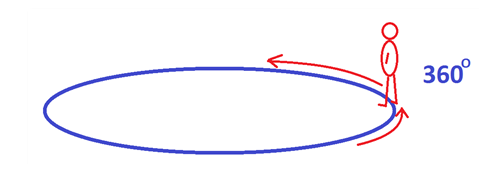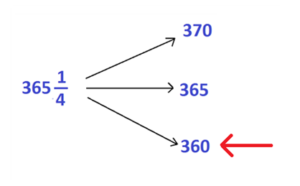Global Math Project Experiences
1.4 How Many Degrees are in a Martian Circle?
Lesson materials located below the video overview.
This is a serious question. I want an actual answer!
How many degrees are in a Martian circle?
When presented with a problem in math (or in life!) there are two fundamental and important first steps to take.
STEP 1: Have an emotional reaction.
Acknowledge your human self by acknowledging your human reaction. If a problem looks scary, say “This looks scary.” If it looks fun, say “Wow! Cool!” If you are flummoxed and don’t have a clue what to do, say “I don’t know what to do!”
Next, take a deep breath, and then
STEP 2: Do something! ANYTHING!
The key is to work past any emotional block that might be holding you back. Turn the page upside down, get up and go for a walk to mull on what to do, draw a diagram, draw a tree, circle some words, answer a different question that might or might not be related.
Our Martian question is very strange and you might be feeling flummoxed by it. What could it possibly be asking?
So let’s change the question! Let’s ask:
How many degrees are in an Earthling’s circle?
Well, we Earthling’s say that there are \(360\) degrees in a circle.

This now begs the question
Why that number? Who chose the number \(360\) for the count of degrees in a circle?
And when you sit with this question for a while you might realize that this number is very close to a count in a large cyclic phenomenon we humans regularly experience: the count of days in a year.
Babylonian scholars of 4000 years ago were very much aware that the count of days in year is \(365\frac{1}{4}\). Shouldn’t we be saying then that there are \(365\frac{1}{4}\) degrees in a circle?
The answer to this question might be clear: Who wants to do mathematics with the number \(365\frac{1}{4}\)? It’s a very awkward number! So the natural thing to do is to round it to a friendlier value.
If we round the number \(365\frac{1}{4}\) to the nearest five or the nearest ten we get \(365\) and \(370\), not the number \(360\)? Why did we humans decide to round down to \(360\)?

Let’s continue to be very human.
Thousands of years ago there were no calculators and all arithmetic had to be conducted by hand or in one’s head. So let’s work with a number that is amenable to easy calculation.
Often in mathematics we want to divide numbers by two, and we see already that choosing \(365\) as the count of degrees in a circle is unfriendly. Both \(370\) and \(360\) are even at least.
And then one realizes that \(360\) is a much friendlier number for arithmetic than \(370\): it is divisible by three, by four, by five, by six, by eight, by nine, by ten, be twelve, by fifteen, by eighteen, by twenty, and more!
Question: How many factors does the number \(360\) have? Compare that with the number of factors \(370\) possesses.
So for two very human reasons—what we experience on this planet and our desire to avoid awkward work—we settled on the number \(360\) for the count of degrees in a circle.
Can we now answer how many degrees are in a Martian circle? What do we need to know?
Martians might follow same reasoning we humans did, but in their context. So we need to know how many Martian days (we call them sols) are in a Martian year.
Each sol is 24 hours and 37 minutes long and Martians experience 667 sols in their year. So we might argue that Martians might initially say that there are \(667\) degrees in a Martian circle. But given that this an awkward number for basic arithmetic, they too will likely round that count to a much friendlier number.
So … What number do you think that might be?
Resources
Books
Take your understanding to the next level with easy to understand books by James Tanton.
BROWSE BOOKS![]()
Guides & Solutions
Dive deeper into key topics through detailed, easy to follow guides and solution sets.
BROWSE GUIDES![]()
Donations
Consider supporting G'Day Math! with a donation, of any amount.
Your support is so much appreciated and enables the continued creation of great course content. Thanks!
Ready to Help?
Donations can be made via PayPal and major credit cards. A PayPal account is not required. Many thanks!
DONATE![]()


